A couple quit their jobs and used their savings to transform a firetruck into a luxury RV for a yearslong Pan-American Highway adventure with their kids. Take a look inside.
Joshua Zitser

- Jasper Luijten and Suzan Huppertz quit their jobs to drive the Pan-American Highway with their kids.
- They bought a 1990 Mercedes L1113 firetruck and paid to have it transformed.
Jasper Luijten, who used to work as an HR director for Koch Industries in Bangkok, Thailand, and his wife, Suzan Huppertz, a podiatrist, left their well-paying jobs to embark on a yearslong family adventure.
Last April, the couple began traveling along the Pan-American Highway, which begins in Alaska and reaches through to Argentina, with their daughters Isa, 6, and Eva, 3.
And they're doing it in an impressive vehicle: an old firetruck they had transformed into a mobile home for the family.
Jasper Luijten and Suzan Huppertz left their jobs to travel the Pan-American Highway with their children.
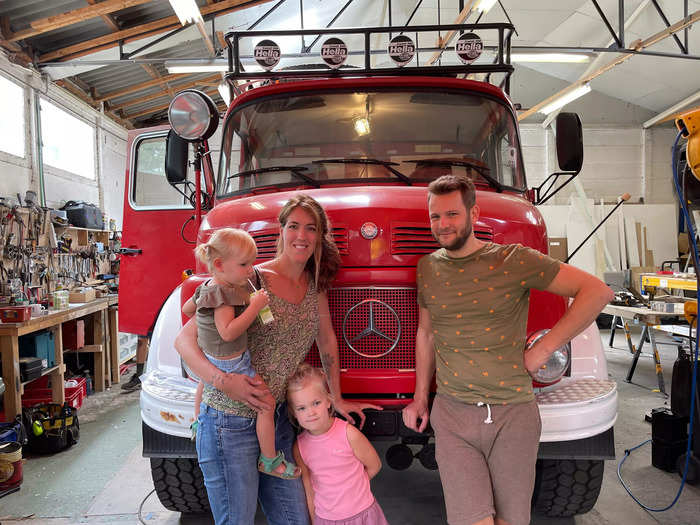
Huppertz and Luijten, along with their daughters Isa, 6, and Eva, 3, are exploring the Americas.
The kids are being homeschooled as the family visits the places on their route, with the trip expected to last at least another year and a half.
While still living in Thailand, they bought an old firetruck online that was listed for sale in Berlin.

A motorhome was essential to their travels across the Americas, and a converted firetruck was considered the perfect choice.
"He found one in Berlin, this one, and we decided to buy it," Huppertz said of her husband in a conversation with Business Insider.
The vehicle was a Mercedes L1113 short-bonnet from 1990.
But due to the COVID-19 pandemic, the family was stranded in Thailand, unable to inspect the truck in person for nearly three years.
They commissioned someone in the Netherlands to convert the vehicle for them.
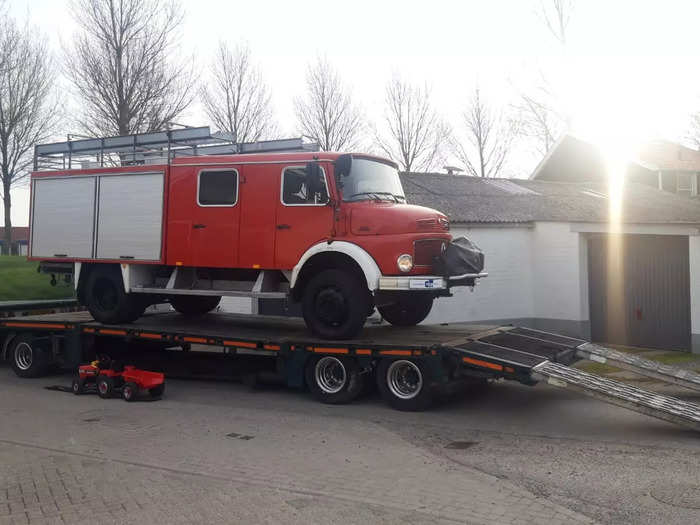
The firetruck was shipped from Germany to their native country, the Netherlands, while they remained in Thailand.
Upon its arrival, Luijten and Huppertz commissioned someone to renovate it.
Luijten says that the person hired had recently undertaken a similar rebuilding of his own firetruck, meaning that he could provide his expertise on the best approaches to refurbishing it.
They discussed changes online from abroad.
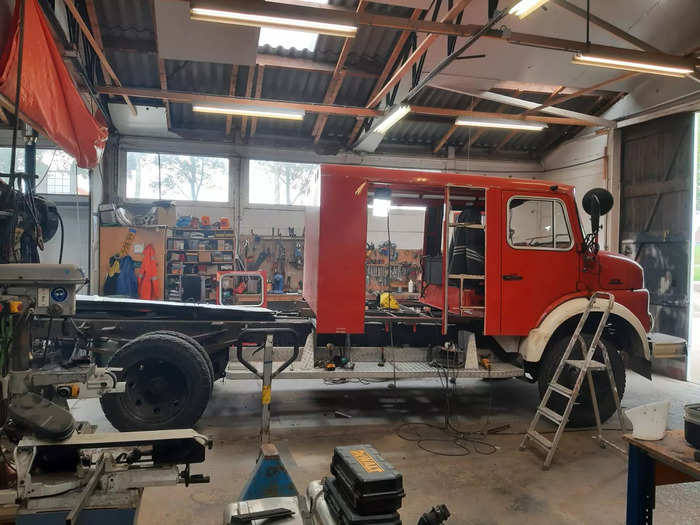
"He is a very good builder, and we had good contact with him," said Huppertz.
According to her husband, they would give the designer examples of firetruck transformations they liked on Instagram, before discussing the feasibility of different approaches.
Luijten explained: "Basically, every two weeks or so, we had a call with him. He would create all the sketches on paper, scan them, and then send them to us."
Stuck far away, the couple realized they had to place their trust in the designer since it was impractical to "control every nut and bolt," Luijten said.
They wanted to preserve certain original features, such as the firetruck's searchlight.
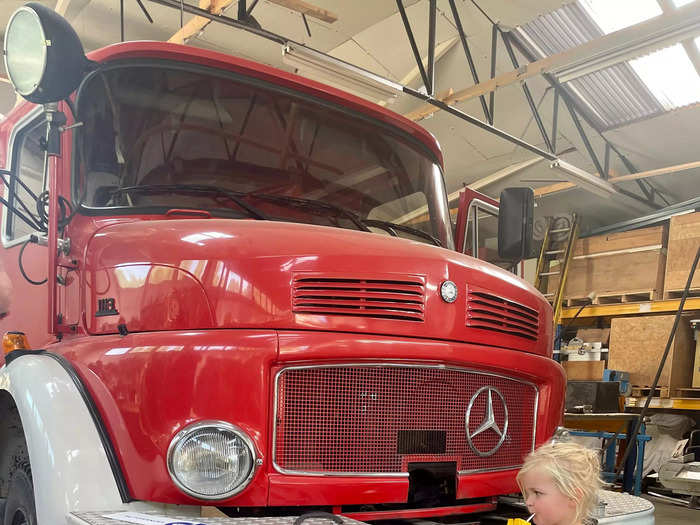
Retaining the searchlight was a must for them.
"That's an original feature that's still there," said Luijten. "Most things had to be removed already, like the lights and the siren."
However, some changes were necessary, including modifying the cabin.
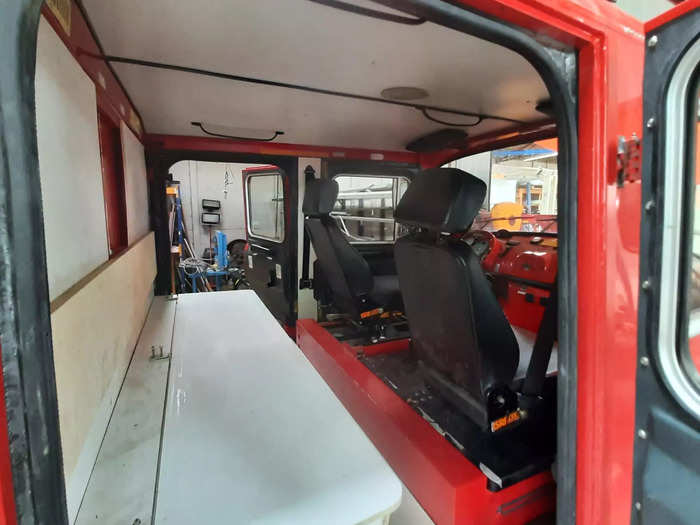
Originally, the cab was a meter longer.
The couple considered cutting the cab behind the front doors to create a two-door setup. However, they ultimately decided to keep the rear doors while shortening the cab.
This modification not only created space for their kids to join them in the cabin, but it also expanded the truck's storage capacity.
The modified cab now includes a bed that's suitable for hosting visitors, although it's quite narrow.
An artist hand-painted the exterior, instantly giving it a new lease of life.
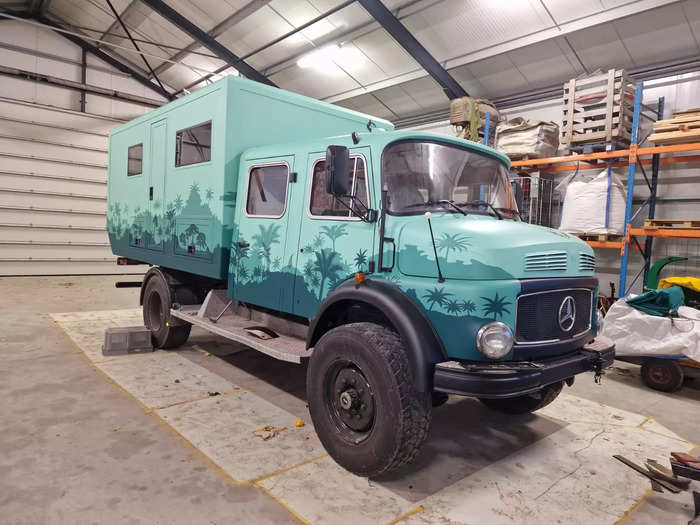
A Netherlands-based artist handpainted the exterior, substituting the firetruck's distinctive red paint with hues of blue and green.
The artwork also features palm tree designs and some of the landscapes they might encounter on their adventure.
But the inside of the cabin remains red, at least for the time being.
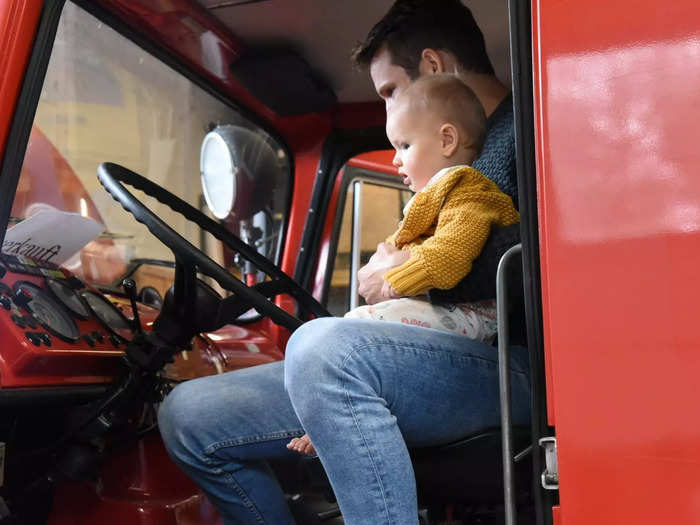
The inside of the cab and the dashboard are still red, which wasn't always the plan.
"We were originally planning to paint that ourselves, but you start traveling and whatever," said Luijten. "You get used to the red dash, and I'm now like, well, actually, it's cool."
The kitchen is compact but serves its purpose.
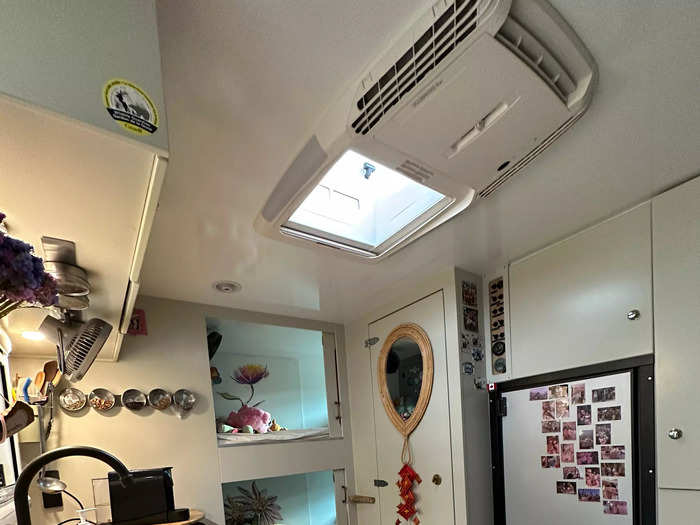
Luijten explained that they had limited space for the kitchen and there weren't really any particularly inventive space-saving solutions.
"You learn to live with the fact that you don't have a lot of space," he said.
Nonetheless, he explained, it is functional and has all the appliances needed to cook a family dinner.
"The kitchen basically has everything," Luijten said. "It has a stove and an oven, a full fridge and freezer."
It also includes a unique item they brought along from Thailand.
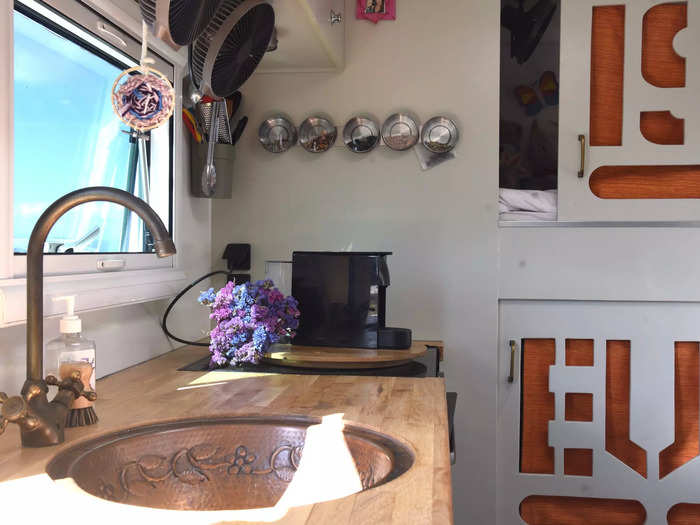
Luijten mentioned an interesting aspect of their kitchen — a sink made of hand-beaten copper.
They brought it with them from Thailand.
"We don't like super modern stuff," he said, adding that they also wanted to have a wooden kitchen counter.
A dining table and a U-shaped couch provide a comfortable space for eating meals together.
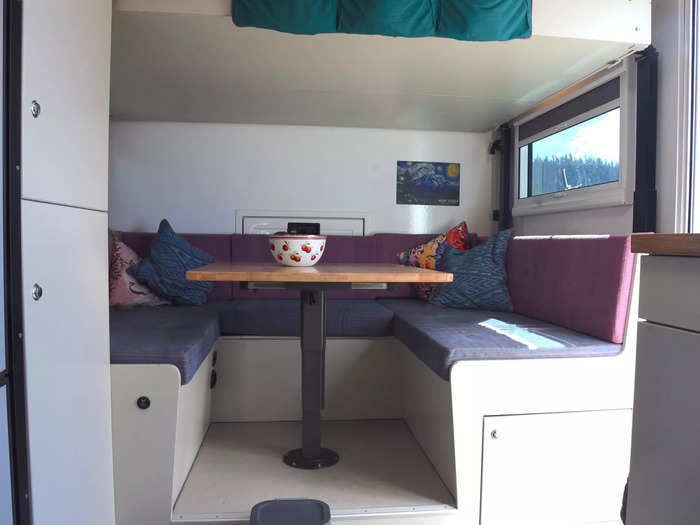
The converted firetruck has a seating area, which they use for eating meals and hosting guests.
"We've had seven people around there, so it's pretty big," Luijten told BI.
The table conveniently folds down to make room for the bed.
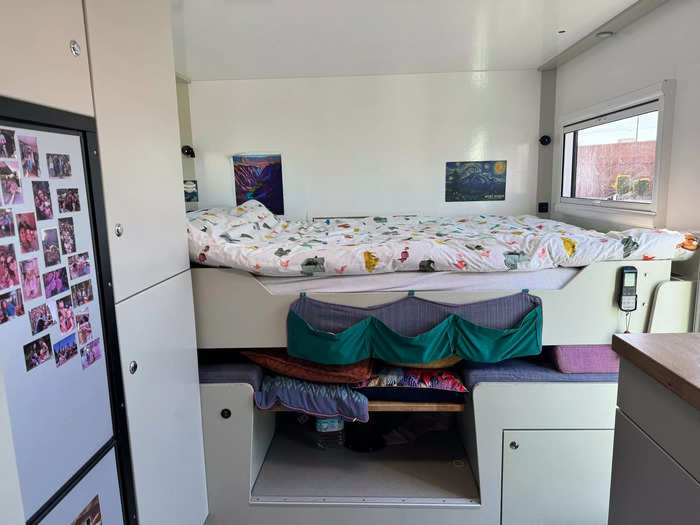
The bed utilizes the legs of a standing desk, and it ascends completely to the roof, getting sandwiched in that position.
"In the evening, you fold the table down, and you flip down all the pillows, and then the bed just comes down electrically," Luijten explained.
While it's an effective space-saving solution, the drawback is that getting ready for bed and hanging out on the couch simultaneously is not possible.
"If one person wants to go to bed, then we've got to fix the whole thing," Luijten told BI. "That's a downside."
To save space, they built bunk beds for the children.
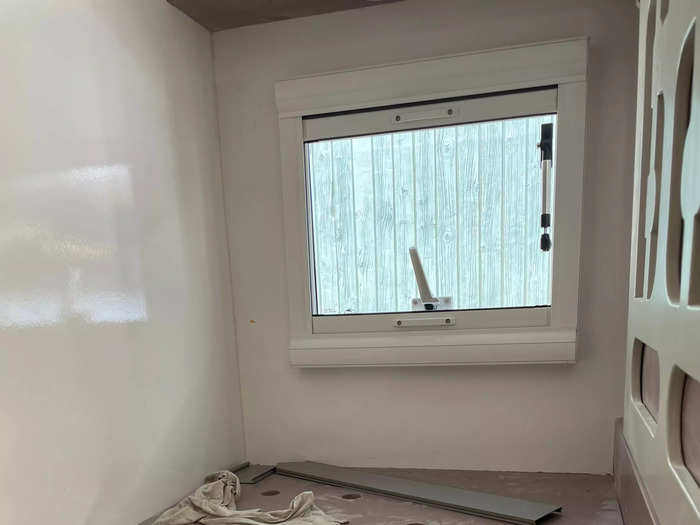
While working out ways to create private sleeping spaces for their two young children, they realized that bunk beds would be a good solution.
According to Luijten, the kids love their private bunks.
"It gives a really secure feeling with their own window, with their own cabinet," he said. "They can close the door and have all lights and all that stuff that feels very secure. So, they sleep really well."
The designer added a personal touch to the kids' beds.
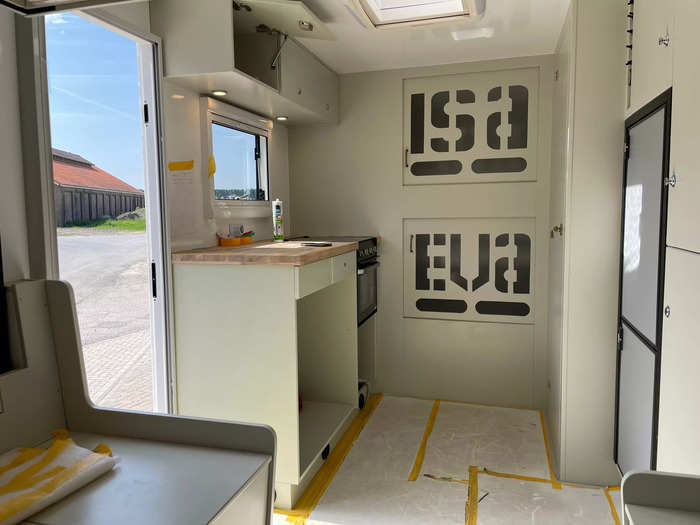
Personalized designs adorn the doors to the children's bunk beds.
According to Luijten, the designer surprised them with this cute feature.
"That's something he just did, so he didn't tell us," he said. "We were like, 'Hey, that's cool.'"
The space only feels cramped when the weather is bad or there's work being done inside.
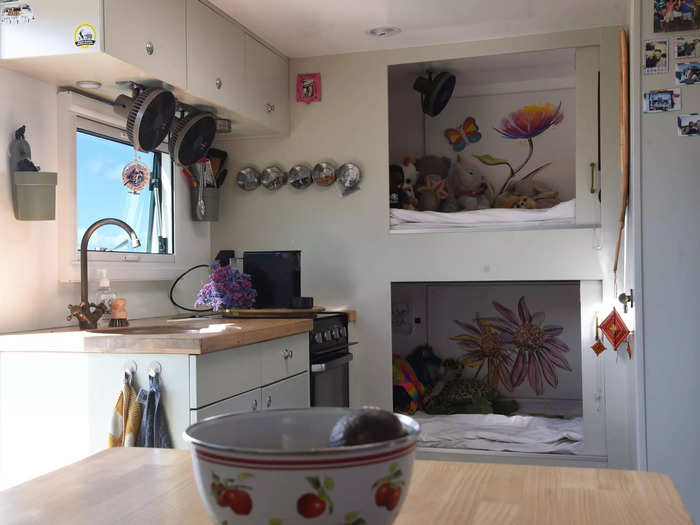
A family of four living in such a confined space can sometimes get a little claustrophobic, but generally, it's manageable, the couple said.
"Most of the time you're spending outside," Luijten said. "It only really feels small when the weather sucks, when it rains, or when it's really cold and wet."
"You don't feel the limitations of space," he continued. "Sometimes it feels small when I have to fix something, and where the four of us are inside and you're all trying to squeeze past each other."
As for how much it cost them to buy and transform the firetruck... they're not saying.
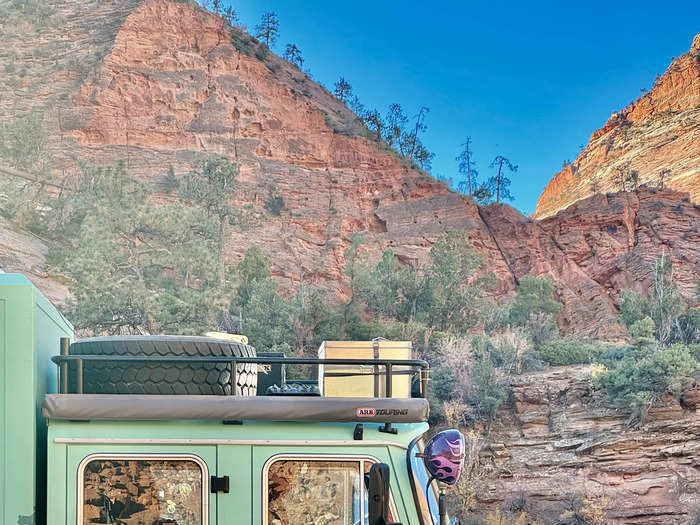
Huppertz said she doesn't think it's wise to share the cost of buying, transforming, and living in the firetruck.
"We travel through a lot of countries and also poor countries and this kind of thing,'" she said." I don't know if that's smart to put on the internet."
The truck needed a name. The children decided to call it 'Fire Rosie.'
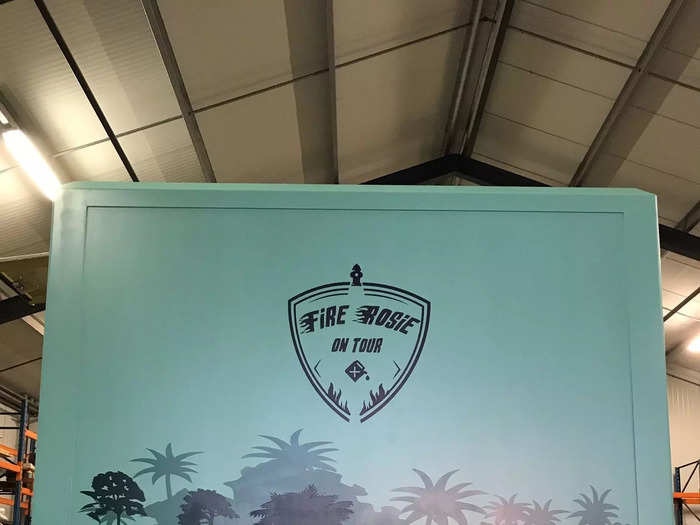
Before embarking on their journey, they needed to name the converted firetruck, a decision they left to their eldest daughter, Isa.
Luijten recounted their first encounter with the truck in the Netherlands during its construction phase, describing its stripped-down state with a bare chassis at the back and a still-red exterior.
He said: "We were standing in front of the truck, and Suzan asked Isa, 'What do you think we should name her?' She shouted out straight away 'Fire Rosie.'"
So that's the name now painted on the back of the vehicle, and is part of the family's Instagram handle.
Currently on the road, the children receive homeschooling while traveling.
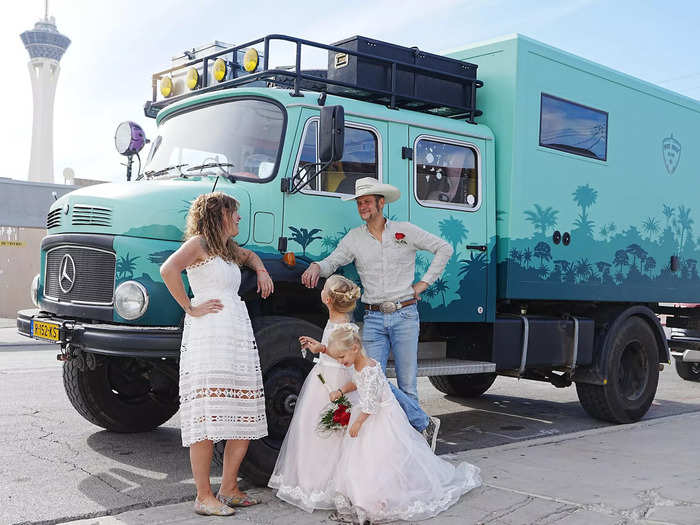
Once completed, the firetruck was shipped across the Atlantic.
They started their journey in Halifax, Canada, in April last year.
Throughout this time, they've been homeschooling their daughters.
"It's difficult to be consistent, I would say," Luijten told BI. "So we skip a day or two here and there. But I also find that homeschooling, you can really work quite effectively."
They tend to homeschool in bursts of 30 minutes, using handbooks and iPad books to educate their kids.
Additionally, they enhance their learning experiences by visiting educational sites along their route, such as former mining towns in the Colorado Mountains, Luijten explained.
They have already explored various major landmarks, with a year and a half left to go on their trip.
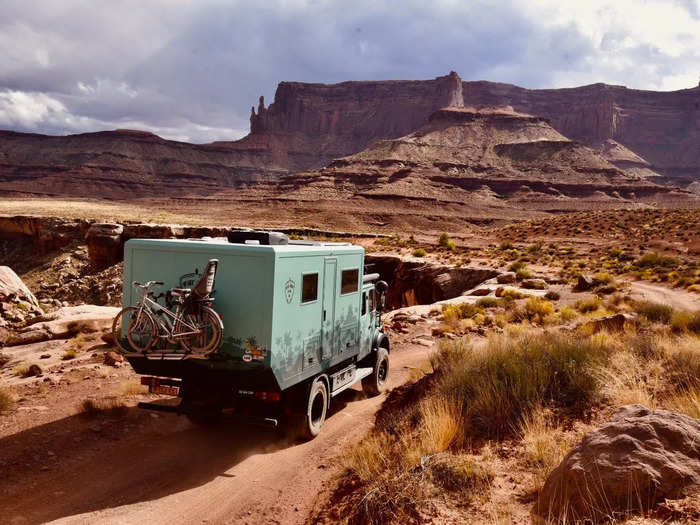
Among the notable experiences on their journey so far, the couple mentioned highlights like Mount Olympus in Washington State and off-roading adventures in Moab, Utah.
With much more of the Americas left to explore, the family intends to continue their travels for at least another year and a half.
Luijten said leaving the corporate world for their on-the-road adventure hasn't changed him.
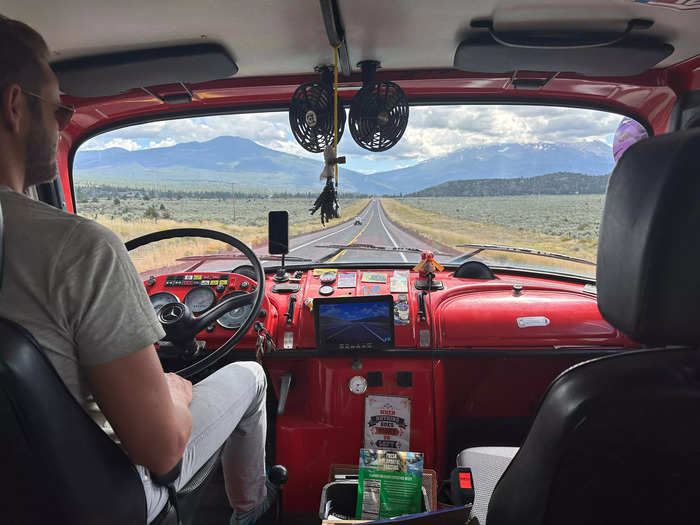
Luijten quit his corporate job for a life on the road, but he doesn't feel like he's been transformed by the change of pace.
"I'm not going to the office anymore, I don't have all the meetings, I don't have the same responsibilities," he said. "But as a person, it hasn't really affected me. I don't think I'm different here than I was there because I've already had that mindset."
He said that living abroad was already an adventure.
Quitting their jobs, however, meant a loss of income, leading to them relying on their savings.
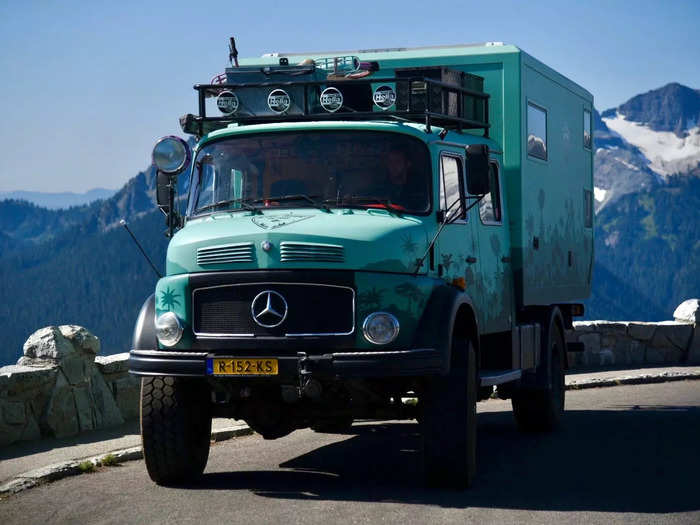
The couple's decision to quit their jobs meant they no longer had a regular income. However, they had saved up a lot of money.
Huppertz said they decided against taking remote jobs because traveling with kids is already tiring, and they wanted to fully immerse themselves in the experience.
"It was scary, though, to quit," Huppertz told BI. Regular income is something "that comes in every month, and you rely on that, and everybody does it. People say that you're crazy, of course. But in the end, it worked out well."
She added: "It feels good, it feels free."
Their advice: think about how much you really want to do this before you start.
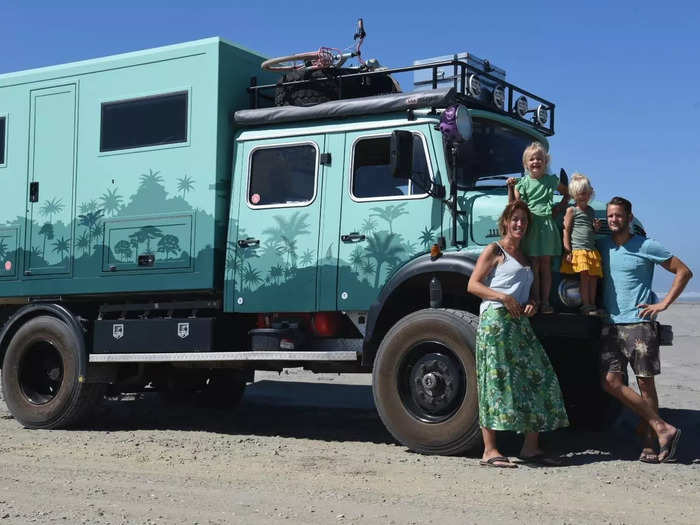
Luijten says that many people tell them they want to undertake a similar journey, but he always highlights that it comes with its share of sacrifices.
For instance, they don't own a house and are temporarily putting their careers on hold to embark on this adventure.
"If you want to do it, then it all comes down to whether you want it bad enough," he said. "How bad do you want something?"
He continued: "There's nothing wrong with saying that's not for me. But have the intellectual honesty to answer for yourself, how badly do I want something?"
Popular Right Now
Popular Keywords
Advertisement